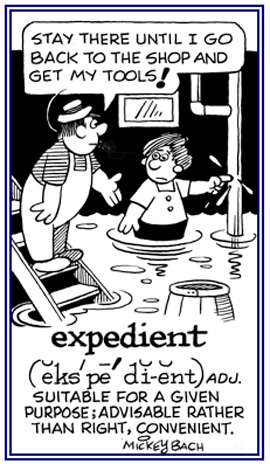ex-, e-, ef-
(Latin: a prefix occurring in words of Latin origin used in the senses: out, out of, from; upward; completely, entirely; to remove from, deprive of; without; former [said of previous holders of office or dignity])
Before f, ex- becomes ef-; before all voiced consonants (as b, d, g, etc.) ex- becomes e-.
2. Demand, look for, require, count on: "The company expects promptness of every employee."
3. Assume, presume, calculate, contemplate: "I expect to see her here soon."
4. Etymology: from the 1550's, "wait, defer action"; from Latin expectare/exspectare, "await, look out for, desire, hope"; from Latin expectare, "look out for", from ex-, "out" + spectare, "to look".
2. A medication that helps bring up mucus and other material from the lungs, bronchi, and trachea.
An example of an expectorant is guaifenesin (expectorant drug used to thin mucus and sputum) which promotes drainage of mucus from the lungs by thinning the mucus and also lubricates the irritated respiratory tract.
Sometimes the term expectorant is incorrectly extended to any cough medicine. It comes from the Latin expectorare, "to expel from the chest"; from ex-, "out of" + pectus, "chest".
2. To eject saliva, mucus, or other body fluid from the mouth; to spit.
3. To clear out the chest and lungs by coughing up and spitting out matter; such as, mucous.
4. To cough up and spit out phlegm, thus clearing the bronchial passages.
5. Etymology: "to clear out the chest or lungs," from Latin expectoratus, past participle of expectore, "scorn, expel from the mind"; litterally "to make a clean breast" from ex-, "out" + pectus, "breast, chest".
Use as a euphemism for "spit" is first recorded 1827.
2. The act of spitting and forcefully expelling saliva.
3. A polysyllabic word for sputum or the act of bringing up and spitting out sputum.
2. Someone who expels matter; such as, phlegm, from the throat or lungs by coughing and spitting it out.
2. A means to an end: Mack used a hidden key as a useful expedient to get into his house because he forgot to take his regular set of keys with him when he went shopping.
3. An objective that is devised or employed as a procedure to achieve a desire; not necessarily an honest one: The governing body was accused of choosing short-term expedients instead of practical economic policies.
The criminal resorted to shady expedients in order to rob banks.
4. Etymology: from Latin, "to free (a person’s) feet from fetters"; an antonym of "impede"; hence, "to free from difficulties, to help forward, to get (a work) completed, to dispatch, to send off", etc.
Go to this Word A Day Revisited Index
so you can see more of Mickey Bach's cartoons.
Frank told his son to be calm, do the right thing, and not to hurry too quickly in order to make an expedient decision.
2. Conveying some proposed or desired objective; fit or suitable for the purpose; proper under the circumstances: Jim thinks it is an expedient idea that he and his wife go home now because the storm could get worse.

Go to this Word A Day Revisited Index
so you can see more of Mickey Bach's cartoons.
2. To deal with something, especially a business transaction, swiftly and efficiently: Jim was told by his insurance company that it would expedite the processing of his insurance claim as soon as possible.
3. Etymology: from Latin expeditus, past participle of expedire, "to make fit or ready, to prepare"; literally, "free the feet from fetters"; hence, "to liberate from difficulties"; from ex-, "out" + pedis "fetter, chain for the feet"; related to pes, pedis, "foot".
When anyone expedites anything, he or she is actually "freeing" the feet for faster action.




